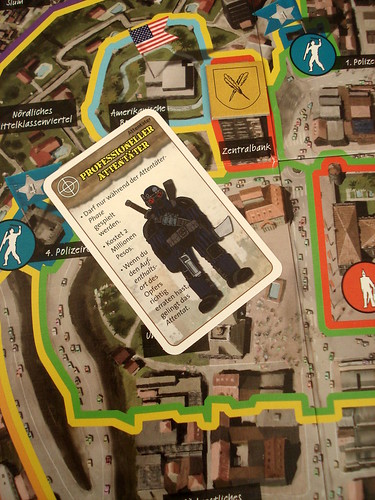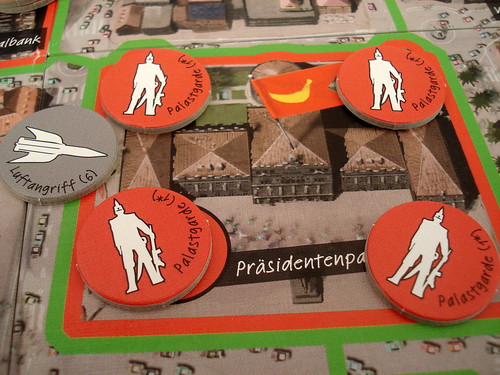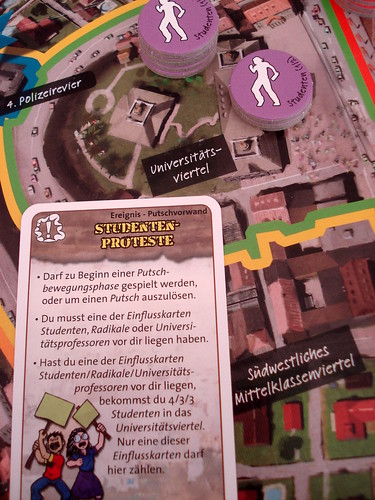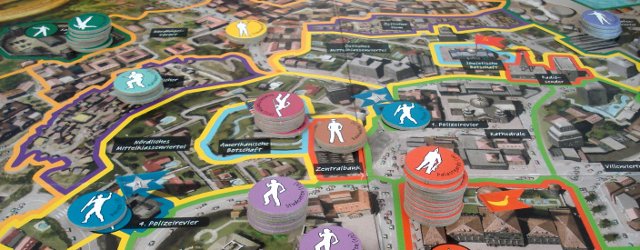Good Morning, Ciudad de los Bananas! It is a fine, sunny day here in Republica de los Bananas and we at Radio Banana Libre would like to congratulate The Glorious Commander of the Revolutionary Forces to his landslide victory in yesterday’s elections. We’re also happy to reports that, with the end of the elections, tanks are no longer blocking most of our main streets and people can once more go about their daily business. Thank you, General Da Silva, for keeping the elections safe and entirely fair and democratic.

Welcome to another entry in our popular series “How to lose friends very quickly and with maximum drama”. Today, we have a very special game from this series: Junta. The original Junta by Vincent Tsao was published in 1975 by Capri … and has pretty much nothing to do with the game most people know as Junta. The original Junta was an abstract strategy game for two players, each controlling 12 generals and trying to dispose the enemy president in his capital. In fact, that Junta is a different game and the only reason to bring it up here is that designer Vincent Tsao also worked on the Junta that we know today.
That game appeared in 1979 from Creative Wargames Workshop and gained its current cult status with the 1985 West End Games edition. Vincent Tsao was joined by Eric Goldberg and Ben Grossman in the credits and everything about this game was different. Just for starters, instead of being a two-player abstract game the new Junta was playable with up two seven players – and was far superior to any other number of players. The goal of the game was no longer to capture your opponents president: now there was only one president and his corrupt junta of power-hungry egomaniacs – the players – and their only goal was to fill up their own swiss bank account. Most of the game was now played without the board – the so-called political game – and the board, a map of the capital of Republica de los Bananas, was only used in case of a military coup.
The game starts with a president being elected. All elections in Junta go by the same basic rules: each member of parliament – the players – has one vote and can control more votes by playing influence cards representing different groups of the population: peasants, socialists, students, sometimes even the dead. The newly elected president then assigns offices to the other players: Minister of Internal Security, Generals of the three armies, Admiral of the Navy and Commander of the Air Force. Assigning these offices is not entirely without bias: the president will assign them to his own advantage or maybe can be persuaded to assign you a particular position in exchange for your support in the election. The commanders of the armed forces have special relevance only in case of a coup, the only office with added political power is the Minister of Internal Security, the president’s most trusted advisor. At least for one round, trust rarely lasts longer in Republica de los Bananas.
The Commander of the Glorious Revolution, El Presidente Diego Da Silva, sat down at his snooker-table sized desk for the fist time. He was already feeling at home in his new office with its marble floor and dark wood furniture. And with Consuela, the Presidential Assistant, who sort of came with the office. She had assisted four presidents before him and was, at this point, the only person left with the knowledge how to actually run the country. When Diego really strained his eyes, he could see all the way to the office’s door that Consuela had just entered through. She looked worried. “Senor El Presidente, the foreign aid money for the year has arrived. It’s fifty percent less than what you promised the leaders of the Glorious Revolution for their support.”

Each round, the president receives a random amount of foreign aid money that he has to distribute between his cabinet members. None of that money goes to its intended purpose of aiding people – that would just be crazy. The president can and should lie about the amount of money received, negotiate about each office’s budget and find a cop-out to keep more money to himself. He can’t be to greedy though, as the parliament does get to vote on his proposed budget. Or, if they disagree too vehemently, the Minister of Internal Security can occupy the parliament with his police forces and force the budget. That’s an easy way to share a lot of money between the Minister and El Presidente, but unfortunately it gives the other players a reason to launch a coup d’état later that turn.
Before it comes to that, differences can still be resolved by less violent measures that are very traditional for this form of government: assassination. The Minister of Internal Security gets to assassinate someone every round, if he wishes, everyone else has to use Assassin Cards. To successfully assassinate another player, you need to guess his location for this round – when in doubt, just try to find him at the bank because that’s where everyone needs to go to put money in his swiss bank account, and only money in Switzerland is save and counts for victory in the end. If some well-placed assassinations didn’t fix the Republic’s internal difficulties, then it’s time for a coup.

For the coup phase, everyone gets to push their armed forces around the map of the capital. Here the military commanders get to shine, their forces are naturally stronger than the police and El Presidente’s Palace Guard. Various groups, from revolting students to monarchists and private security forces, can be drawn into the coup by playing the right cards. To keep things simple, the coup has only to sides: loyalists and rebels. Whichever side controls more of the five strategically important locations – bank, President’s Palace, radio station, station and parliament – wins and either stays in power or gets into power. And it’s not a proper revolution unless someone ends up with a blindfold, in front of a brick wall and with a last cigarette between his lips. The victorious side is happy to comply with this cliché.
If you fall victim to assassination or get shot by the Glorious Revolutionary Army – or the Equally Glorious Loyal Presidential Forces, doesn’t really make a difference – you’re not eliminated from the game: your offices are taken over by your son, cousin, son-in-law or other conveniently available heir. There is no player elimination in Junta, and you should be happy for it: being eliminated in Junta, you might as well go home for the night, a game usually takes longer than three and may well run for six hours with enough coups and secret negotiations. Despite the length and the backstabbing and double-crossing nature – okay, more likely because of the latter – Junta has a dedicated fan base and has been available almost continuously since 1978, with the latest English edition from 2005 and the German one from 2010. Seems political satire doesn’t go out of style.
After less than a month in his office, Presidente Da Silva was thinking much less favourably of the giant room. The news of the lacking foreign aid funds had not gone over well with his co-revolutionaries and now he was afraid of every shadow in his office that was big enough to contain an assassin. He had had his desk moved all the way back to the window so no one would be able to sneak up on him. All that did was put him in the path of the first artillery shell when the bombardment of the Presidential Palace started. The Glorious Counter-Revolution had begun.








